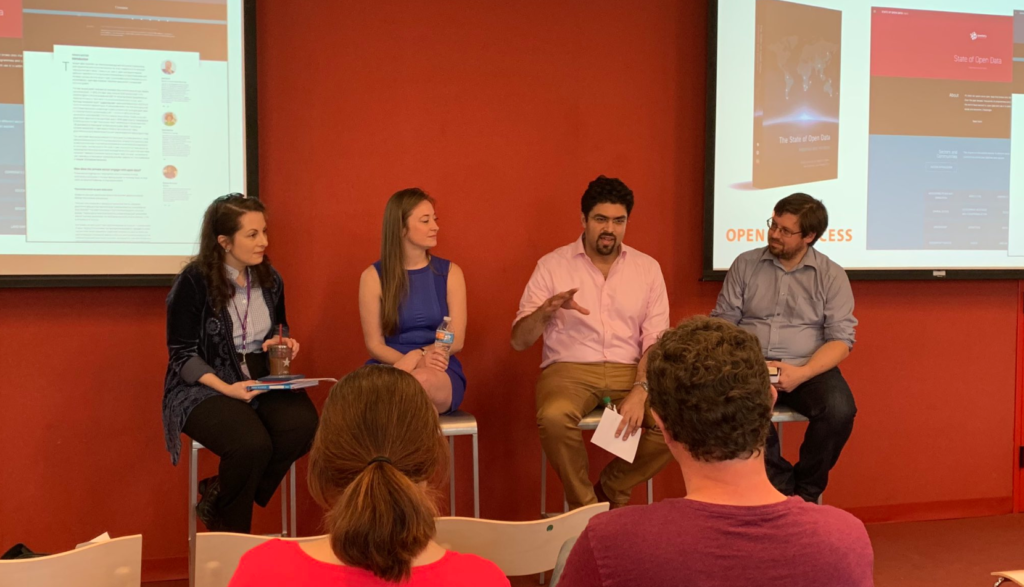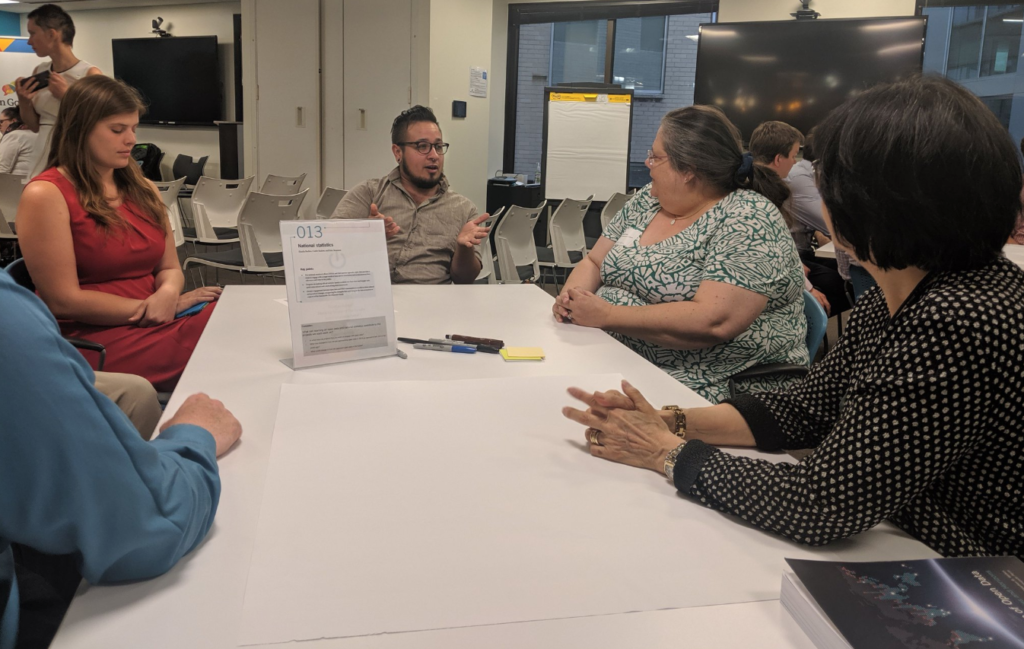[Summary: thinking aloud with five reflections on future directions for ope data related work, following discussions around the US east coast]
Over the last week I’ve had the opportunity to share findings from The State of Open Data: Histories and Horizons in a number of different settings: from academic roundtables, to conference presentations, and discussion panels.
Each has been an opportunity not only to promote the rich open access collection of essays just published, but also a chance to explore the many and varied chapters of the book as the starting point for new conversation about how to take forward an open approach to data in different settings and societies.
In this post I’m going to try and reflect on a couple of themes that have struck me during the week. (Note: These are, at this stage, just my initial and personal reflections, rather than a fully edited take on discussions arising from the book.)

Renewing open advocacy in a changed landscape
The timeliness of our look at the Histories and Horizons of open data was underlined on Monday when a tweet from Data.gov announced this week as their 10th anniversary, and the Open Knowledge Foundation, also celebrated their 15th birthday with a return to their old name, a re-focussed mission to address all forms of open knowledge, and an emphasis on creating “a future that is fair, free and open.”As they put it:
” …in 2019, our world has changed dramatically. Large unaccountable technology companies have monopolised the digital age, and an unsustainable concentration of wealth and power has led to stunted growth and lost opportunities. “
going on to say
“we recognise it is time for new rules for this new digital world.”
Not only is this a welcome and timely example of the kind of “thinking politically” we call for in the State of Open Data conclusion, but it chimes with many of the discussions this week, which have focussed as much on the ways in which private sector data should be regulated as they have on opening up government data.
While, in tools like the Open Data Charter’s Open Up Guides, we have been able to articulate a general case for opening up data in a particular sector, and then to enumerate ‘high value’ datasets that efforts should attend to, future work may need to go even deeper into analysing the political economy around individual datasets, and to show how a mix of voluntary data sharing, and hard and soft regulation, can be used to more directly address questions about how power is created, structured and distributed through control of data.
As one attendee at our panel at the Gov Lab put it, right now, open data is still often seen as a “perk not a right”. And although ‘right to data’ advocacy has an important role, it is by linking access to data to other rights (to clean air, to health, to justice etc.) that a more sophisticated conversation can develop around improving openness of systems as well as datasets (a point I believe Adrienne Schmoeker put in summing up a vision for the future).
Policy enables, problems drive
So does a turn towards problem-focussed open data initiatives mean we can put aside work on developing open data policies or readiness assessments? In short, no.
In a lunchtime panel at the World Bank, Anat Lewin offered an insightful reflection on The State of Open Data from a multilateral’s perspective, highlighting the continued importance of developing a ‘whole of government’ approach to open data. This was echoed in Adrienne Schmoeker’s description at The Gov Lab of the steps needed to create a city-wide open data capacity in New York. In short, without readiness assessment and open data policies put in place, initiatives that use open data as a strategic tool are likely to rub up against all sorts of practical implementation challenges.
Where in the past, government open data programmes have often involved going out to find data to release, the increasing presence of data science and data analytics teams in government means the emphasis is shifting onto finding problems to solve. Provided data analytics teams recognise the idea of ‘data as a team sport’, requiring not just technical skills, but also social science, civic engagement and policy development skill sets – and providing professional values of openness are embedded in such teams – then we may be moving towards a model in which ‘vertical’ work on open data policy, works alongside ‘horizontal’ problem-driven initiatives that may make less use of the language of open data, but which still benefit from a framework of openness.

Political economy really matters
It’s been really good to see the insights that can be generated by bringing different chapters of the book into conversation. For example, at the Berkman-Klein Centre, comparing and contrasting attitudes in North America vs. North Africa towards the idea that governments might require transport app providers like Uber to share their data with the state, revealed the different layers of concern, from differences in the market structure in each country, to different levels of trust in the state. Or as danah boyd put it in our discussions at Data and Society, “what do you do when the government is part of your threat model?”. This presents interesting challenges for the development of transnational (open) data initiatives and standards – calling for a recognition that the approach that works in one country (or even one city), may not work so well in others. Research still does too little to take into account the particular political and market dynamics that surround successful open data and data analytic projects.
A comparisons across sectors, emerging from our ‘world cafe’ with State of Open Data authors at the OpenGovHub also shows the trade-offs to be made when designing transparency, open data and data sharing initiatives. For example, where the extractives transparency community has the benefit of hard law to mandate certain disclosures, such law is comparatively brittle, and does not always result in the kind of structured data needed to drive analysis. By contrast, open contracting, in relying on a more voluntary and peer-pressure model, may be able to refine it’s technical standards more iteratively, but perhaps at the cost of weaker mechanisms to enforce comprehensive disclosure. As Noel Hidalgo put it, there is a design challenge in making a standard that is a baseline, on top of which more can be shared, rather than one that becomes a ceiling, where governments focus on minimal compliance.
It is also important to recognise that when data has power, many different actors may seek to control, influence and ultimately mess with it. As data systems become more complex, the vectors for attack can increase. In discussions at Data & Society, we briefly touched on one cases where a government institution has had to take considerable steps to correct for external manipulation of it’s network of sensors. When data is used to trigger direct policy response (e.g. weather data triggering insurance payouts, or crime data triggering policing action), then the security and scrutiny of that data becomes even more important.
Open data as a strategic tool for data justice
I heard the question “Is open data dead?” a few times over this week. As the introductory presentation I gave for a few talks noted, we are certainly beyond peak open data hype. But, the jury is, it seems, still very much out on the role that discourses around open data should play in the decade ahead. At our Berkman-Klein Centre roundtable, Laura Bacon shared work by Omidyar/Luminate/Dalberg that offered a set of future scenarios for work on open data, including the continued existence of a distinct open data field, and an alternative future in which open data becomes subsumed within some other agenda such as ‘data rights’. However, as we got into discussions at Data & Society of data on police violence, questions of missing data, and debates about the balancing act to be struck in future between publishing administrative data and protecting privacy, the language of ‘data justice’ (rather than data rights) appeared to offer us the richest framework for thinking about the future.
Data justice is broader than open data, yet open data practices may often be a strategic tool in bringing it about. I’ve been left this week with a sense that we have not done enough to date to document and understand ways of drawing on open data production, consumption and standardisation as a form of strategic intervention. If we had a better language here, better documented patterns, and a stronger evidence base on what works, it might be easier to both choose when to prioritise open data interventions, and to identify when other kinds of interventions in a data ecosystem are more appropriate tools of social progress and justice.
Ultimately, a lot of discussions the book has sparked have been less about open data per-se, and much more about the shape of data infrastructures, and questions of data interoperability. In discussions of Open Data and Artificial Intelligence at the OpenGovHub, we explored the failure of many efforts to develop interoperability within organisations and across organisational boundaries. I believe it was Jed Miller who put the challenge succinctly: to build interoperable systems, you need to “think like an organiser” – recognising data projects also as projects of organisational change and mass collaboration. Although I think we have mostly moved past the era in which civic technologists were walking around with an open data hammer, and seeing every problem as a nail, we have some way to go before we have a full understanding of the open data tools that need to be in everyones toolbox, and those that may still need a specialist.
Reconfiguring measurement to focus on openness of infrastructure
One way to support advocacy for openness, whilst avoiding reifying open data, and integrating learning from the last decade on the need to embed open data practices sector-by-sector, could be found in an updated approach to measurement. David Eaves made the point in our Berkman-Klein Centre roundtable that the number of widely adopted standards, as opposed to the number of data portals or datasets, is a much better indicator of progress.
As resource for monitoring, measuring or benchmarking open data per-se becomes more scarce, there is an opportunity to look at new measurement frames that look at the data infrastructure and ecosystem around a particular problem, and ask about the extent of openness, not only of data, but also of governance. A number of conversations this week have illustrated the value of shifting the discussion onto data infrastructure and interoperability: yet (a) the language of data infrastructure has not yet taken hold, and can be hard to pin down; and (b) there is a risk of openness being downplayed in favour of a focus on centralised data infrastructures. Updating open data measurement tools to look at infrastructures and systems rather than datasets may be one way to intervene in this unfolding space.